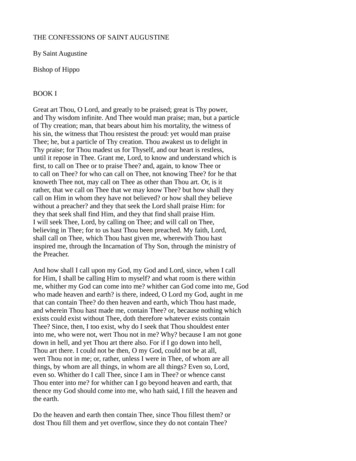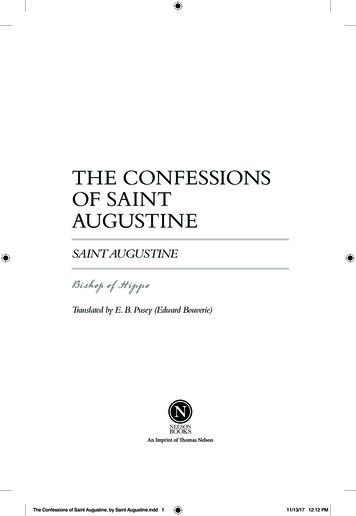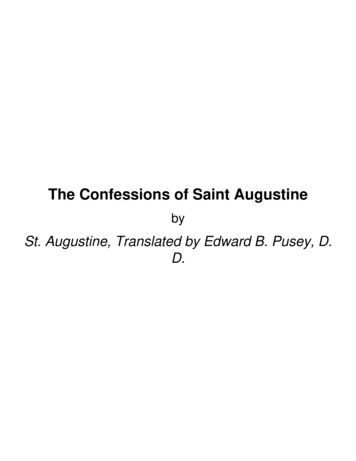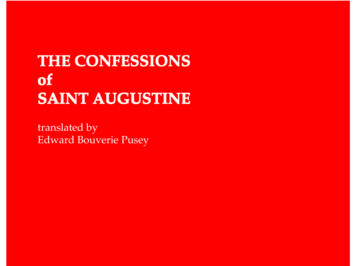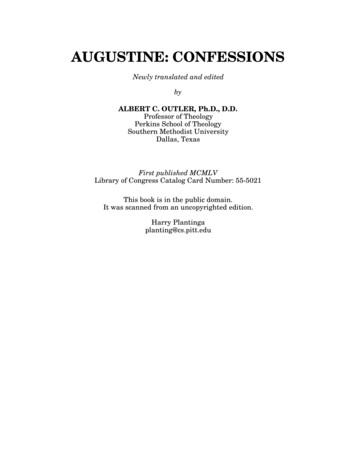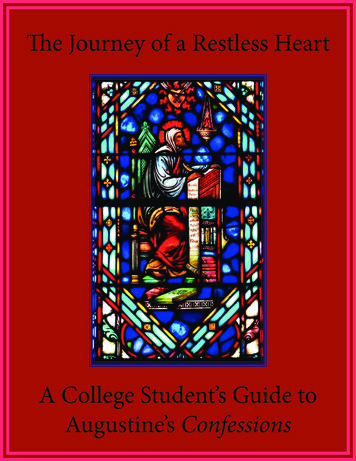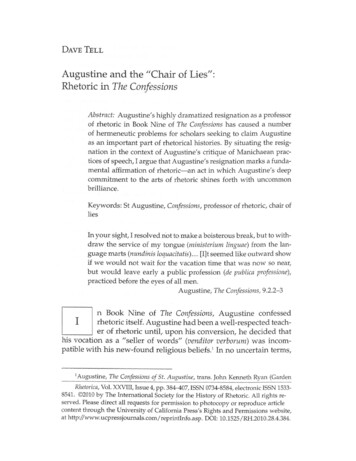
Transcription
DAVE T E L LAugustine and the "Chair of Lies":Rhetoric in The ConfessionsAbstract: Augustine's highly dramatized resignation as a professorof rhetoric in Book Nine of The Confessions has caused a numberof hermeneutic problems for scholars seeking to claim Augustineas an important part of rhetorical histories. By situating the resignation in the context of Augustine's critique of Manichaean practices of speech, I argue that Augustine's resignation marks a fundamental affirmation of rhetoric—an act in which Augustine's deepcommitment to the arts of rhetoric shines forth with uncommonbrilliance.Keywords: St Augustine, Confessions,liesprofessor of rhetoric, chair ofIn your sight, I resolved not to make a boisterous break, but to withdraw the service of my tongue (ministerium linguae) from the language marts (nundinis loquacitatis). [I]t seemed like outward showif we would not wait for the vacation time that was now so near,but would leave early a public profession (de publicaprofessione),practiced before the eyes of all men.Augustine, The Confessions, 9.2.2-3n Book Nine of The Confessions, Augustine confessedrhetoric itself. Augustine had been a well-respected teachIer of rhetoric until, upon his conversion, he decided thathis vocation as a "seller of words" (venditor verborum) was incompatible with his new-found religious beliefs. In no uncertain terms,11Augustine, The Confessions of St. Augustine, trans. John Kenneth Ryan (GardenRhetorica, Vol. XXVIII, Issue 4, pp. 384-407, ISSN 0734-8584, electronic ISSN 15338541. 2010 by The International Society for the History of Rhetoric. All rights reserved. Please direct all requests for permission to photocopy or reproduce articlecontent through the University of California Press's Rights and Permissions website,at http://www.ucpressjournals.com/reprintlnfo.asp. DOI: 10.1525/RH.2010.28.4.384.
385Augustine and the "Chair of Lies"Augustine confessed that his conversion to Christianity compelledhim to abandon his "chair of lies" (cathedra mendacii) in favor ofa holier calling. James J.Murphy captures well the religious fervor with which Augustine disavowed his calling as a professor ofrhetoric: "It would be only a slight exaggeration to say that in a sense[Augustine] was converted from rhetoric to Christianity."This conversion, of course, is one of the most troubling passagesfor those seeking to claim for Augustine an important place in thehistories of rhetorical theory. Catherine Chin succinctly explains thedilemma facing such scholars. Augustine, she writes, was "a lateRoman rhetor; yet rhetoric, both as a practice and a profession, ismarkedly problematic to the Augustine of the Confessions.'' Scholarshave responded to this problem with strategies of containment. Murphy, for example, asks scholars to consider Augustine's resignation asa professor of rhetoric as exceptional, as out of keeping with his largerproject of adapting the secular ars rhetorica for Christian purposes.Calvin Troup, advocating another strategy of containment, arguesthat we should understand Augustine's resignation not as a rejection of rhetoric tout court, but a rejection of the historically specificand theoretically unique rhetoric of the Second Sophistic. In bothcases, the strategy has been to contain and circumscribe Augustine'sresignation. It seems that there has been a widely shared impulsethat if Augustine is to remain a significant part of rhetorical histories,his rather embarrassing dismissal of rhetoric must be contained andlimited; it must be shown that this dismissal is marginal, exceptional,and not related to Augustine's otherwise important contributions torhetorical theory.I argue just the opposite. I believe that Augustine's resignation ofthe professoriate is not an exceptional moment in his rhetorical theory; rather, it marks the culmination of a critique of Manichaean practices of speech that spans the entirety of The Confessions. At the heart of22,45City: Image Books, I960), 9.5.13 (hereafter cited parenthetically in the text using theLatin abbreviation, Conf.).James J. Murphy, "Saint Augustine and the Christianization of Rhetoric," WesternJournal of Communication 22 (1958): 24-29 (p. 26).Catherine M. Chin, "Christians and the Roman Classroom: Memory, Grammar,and Rhetoric in Confessions X," Augustinian Studies 33.2 (2002): 161-83 (p. 162).Murphy, "Saint Augustine and the Christianization of Rhetoric," cited in n. 2above, p. 27.Calvin L. Troup, Temporality, Eternity, and Wisdom: The Rhetoric of Augustine'sConfessions (Columbia: University of South Carolina Press, 1999), 11-35.2345
386RHETORICAthis critique is Augustine's indictment of a distinctively Manichaeanrhetorical form: the profession (professio). The definitive characteristic of professio is loquacity {loquacitas) and, as the above epigraphsuggests, it is, precisely speaking, the selling of loquacity that thepost-conversion Augustine relegates to his sinful past. To be sure,critiques of loquacity, talkativeness, or chattering were somethingof a cultural commonplace, the locus classicus being Plutarch's OfGarrulity, or Talkativeness? Augustine, however, brings to the standard critique a radical edge: while Plutarch complains that loquacitydisables memory and undermines persuasion, Augustine claims thatloquaces are mutos; that it is, in very real ways, silent. This is a peculiarclaim, and I will interrogate it at length below. For the moment, however, I want to emphasize that Augustine's critique of the Manichaeanprofessio as a rhetorical form invites us to reconsider his resignation ofthe "chair of lies": while it is certainly true that Augustine resigned hisjob as a professor of rhetoric (professione rhetorica), I argue that thisresignation is better understood as a rejection of professing ratherthan a rejection of rhetoric (Con/., 9.4.7). Indeed, because Augustinebelieved that profession, as a rhetorical form, eventuated in silence, Iargue that we can read his resignation as an act undertaken on behalfof rhetoric itself. So understood, the resignation is no longer an embarrassment to be explained, but an achievement to be heralded—anact in which Augustine's deep commitment to the arts of rhetoricshines forth with uncommon brilliance. And if this is the case, weshould understand that when Augustine confesses rhetoric in BookNine of The Confessions, he does not do so in the sense that Murphysuggests; it is not a confessio peccatorum—an acknowledgement of sinthat leads to conversion. Rather it is a confessio laudis—an affirmationof his belief in rhetoric.The argument proceeds in three sections. First, I account for thestandard moves in the interpretation of Augustine's resignation. Iargue that the resignation cannot be accounted for with recourse to68T h e Manichaeans, Augustine writes, "Profess themselves": "They become vainin their thoughts and 'profess themselves to be wise/ by attributing to themselvesthings that are yours" (Con/., 5.3.5).Plutarch, Of Garrulity, or Talkativeness (The Online Library of Liberty, 2008);http://oll.Ubertyfund.org/?option com taticxt&staticfile show.php%3Ftitle 1214&chapter 92421&layout html&Itemid 27. See also, Michel Foucault, Tearless Speech(Los Angeles: Semiotext(e)), 63.O n the ambiguity of the verb confiteor and the noun confessio in Augustine'swork, see James J. O'Donnell, Augustine: Confessions. 3 vols. (New York: OxfordUniversity Press, 1992); http://www.stoa.org/hippo/comml.html.678
Augustine and the "Chair of Lies387either Augustinian theology or the historical backdrop of the Second Sophistic. Second, I advance my own explanation of the resignation, suggesting that it be understood in terms of his critiqueof the Manichaean professio. Third, I argue that the professio is bestunderstood as the form of expression proper to a particular subjectivity, the distended self. It is precisely this relationship betweenthe professio and the distended self that explains Augustine's insistence that Manichaean practices of speech are functionally silent,and it is thus this relationship that allows us to read the resignation as an affirmation of rhetoric. I conclude by suggesting how thisanalysis might help us revise the rhetorical lessons we learn fromAugustine.READING THERESIGNATIONIt is not surprising that Augustine's famous desertion of the professoriate has troubled scholars seeking to make sense of Augustineas a rhetorician who holds an important place in histories of rhetoricaltheory Two dominant strains of interpretation contain and mitigatethe force of Augustine's resignation by explaining it with recourseto either Christian theology or rhetorical history. Although these interpretations are distinct in many ways, it is their shared assumptionthat I wish to foreground here: both see in Augustine's resignation ofthe professoriate a critique of rhetoric to be explained rather than anaffirmation of rhetoric to be celebrated. I attend to each explanationin turn.The fact that Augustine abandoned his post as a professor ofrhetoric immediately following his conversion—and that he did sowith religious fervor—has led some scholars to argue that Augustine's resignation constitutes a theological critique of rhetoric. Onthis score, it is Augustine's conversion to Christianity that marksthe death knell for the privileged place of rhetoric in his thought.Classicist Harold Hagendahl, for example, suggests that "rhetoric isnot exempted from the contemptuous censure of profane culture"that is the Confessions. Such conclusions, however, are at pains toreconcile themselves with Augustine's post-conversion celebrations9Harold Hagendahl, Augustine and the Latin Classics (Stockholm: Almqvist &Wiksell, 1967), 557. Or, see Murphy: "Rhetoric at the end of the fourth century wasassociated with things pagan, Roman, non-Christian" (Murphy, "Saint Augustine andthe Christianization of Rhetoric/ cited in n. 2 above, p. 26).9
RHETORICA388of "profane culture" in general, and his continued dedication to thears rhetorica in particular. To the latter point, the fourth book of Dedoctrina Christiania provides Augustine's "most complete statementon rhetorical theory" and appears to completely reconcile Christianity and rhetoric. In one of the most quoted sentences of the text,Augustine writes,1011For since by means of the art of rhetoric both truth and falsehoodare urged, who would dare say that the truth should stand in theperson of its defenders unarmed against lying, so that they who wishto urge falsehoods may know how to make their listeners benevolent, orattentive, or docile in their presentation, while the defenders of truth areignorant of that art?Augustine concludes that the art of rhetoric should be learned anddeployed by Christians "for the uses of the good" and "the service of truth." Augustine's resignation, then, cannot be explainedwith recourse to a fundamental tension between Christian theologyand rhetorical practice. While this tension certainly motivated suchthinkers as Jerome and Tertullian, for Augustine the art of rhetoricwas never reducible to a profane practice fit only for the civitasterrena.Michael Leff and James Murphy have forwarded a slightly different reading of the relationship between Augustinian rhetoric andAugustinian theology In their own ways, they each argue that Augustine's rhetorical project was one of adaptation; it was the workof appropriating the secular ars rhetorica for the holy purposes of theChurch. In so far as one is dealing with De doctrina Christiana, thisis a highly defensible thesis. Yet, if scholars such as Hagendahl have121314Augustine on the celebration of culture: "Lord, I have loved the beauty ofthy house" (Augustine, City of God, trans. Henry Bettenson (London: Penguin, 1984),XXIL21); hereafter cited parenthetically using the Latin abbreviation, DCD. Brownnotes: "For, if the material world, and with it, the human body, had been a perfect giftof God, it could never be treated as second-best": Peter Brown, Augustine of Hippo:A Biography, 2nd ed. (Berkeley: University of California Press, 2000), 327."Michael C. Leff, "St. Augustine and Martianus Capella: Continuity and Changein Fifth-Century Latin Rhetorical Theory," Communication Quarterly 24.4 (1976): 2-9(p. 4).Augustine, On Christian Doctrine, trans. D. W. Robertson (Indianapolis: BobbsMerrill, 1958), 4.2.3 (hereafter cited parenthetically by its Latin abbreviation, DDC).The language of adaptation is Murphy's ("Saint Augustine and the Christianization of Rhetoric," cited in n. 2 above, p. 27).Augustine himself seems to endorse this thesis: "When the Christian separateshimself in spirit from their miserable society, he should take this treasure [the liberaldisciplines] with him for the just use of teaching the gospel" (DDC, 2.40).10121314
Augustine and the "Chair of Lies389difficulty accounting for Augustine's later affirmation of rhetoric,scholars who celebrate Augustine's adaptation of rhetorical theoryfor Christianity typically have trouble accounting for The Confessions.Leff and Murphy, for example, each celebrate Augustine's formulations of a uniquely "Christian" rhetorical theory," but both passover in silence Augustine's resignation. In Rhetoric in the MiddleAges Murphy does mention Augustine's contempt for his "chair oflies," but suggests that focusing on this contempt "may obscure"Augustine's very real contributions to rhetorical theory made in Dedoctrina Christiana. It is as if the Christianization of rhetoric requiresignoring the passages in the Confessions that suggest that Augustineconverted from rhetoric to Christianity.In sum, the relationship between theology and rhetoric in Augustine's work is, at the least, a vexed relationship. The ability ofLeff and Murphy to largely reverse Hagendahl's thesis is perhapsevidence that we cannot explain Augustine's resignation of rhetoricby focusing on the relationship between theology and rhetoric. Thisis not to say that Augustine's theological beliefs play no part in hisresignation of the "chair of lies." They clearly do. Yet I do not believethat we can explain the resignation with sole recourse to theological categories. For too many years and for too many scholars thisrecourse has suggested that the post-conversion Augustine divided15161718Hagendahl seems to assume that Augustine simply changed his mind betweenthe disavowal of rhetoric in the Confessions and its re-affirmation in De doctrinaChristiana. Although Augustine did change his mind on a number of substantialissues over the course of his writings (see Robert Markus, Saeculum: History andSociety in the Theology of Augustine (Cambridge: Cambridge University Press, 1988)),James O'Donnell has argued that speech is not one of them: See 0'Donne\l,Confessions,cited in n. 8 above, 2:28.Leff, "St. Augustine and Martianus Capella," cited in n. 11 above, and James J.Murphy, "Saint Augustine and the Debate About a Christian Rhetoric," QuarterlyJournal of Speech 46.4 (1960): 400-10. Murphy even lists the works of Augustinerelevant to the rhetorician: the Confessions is notably absent. James J. Murphy, 'TheMetarhetorics of Plato, Augustine, and McLuhan: A Pointing Essay," Philosophyand Rhetoric 4 (1971): 201-14 (p. 205). See also Patton, who provides an in-depthconsideration of Augustine's rhetorical theory and practice with no mention ofAugustine's disavowals of the art in The Confessions: John H. Patton, "Wisdom andEloquence: The Alliance of Exegesis and Rhetoric in Augustine," Central States SpeechJournal 28 (1977): 96-105.James J. Murphy, Rhetoric in the Middle Ages: A History of Rhetorical Theory fromSaint Augustine to the Renaissance (Berkeley: University of California Press, 1974),47-48.Arendt argues that academic thought has, since its inception, been plagued bya series of reversals, all of which indicate a certain inattentiveness to historical eventsand actual practices: Hannah Arendt, The Human Condition (Chicago: The Universityof Chicago Press, 1958), 292-93.15161718
390RHETORICAthe world into the sacred and the profane, either embracing the former and dismissing the latter or deploying the former to transformthe latter. Such was not the case.A second explanation for Augustine's resignation of the professoriate suggests that it was a rejection of the rhetorical practices of theSecond Sophistic. In this vein, Calvin Troup suggests that what Augustine rejects upon his conversion is not rhetoric as such, but the historically specific rhetorical practices of the Second Sophistic. Troupis careful to note that Augustine does not even reject the whole ofthe Second Sophistic, but only those portions of it that would falselydivide philosophy from rhetoric. For once philosophy and rhetoricwere sundered it was but a short theoretical step to the dichotomization of form and content. On this view, as Murphy notes, it wasprecisely Augustine's "firm espousal of a union between meaningand expression that marks his rejection of the sophistic" and explains his denunciation of the professoriate. Rhetorician ChristineMason Sutherland agrees; she argues, "It was precisely the sophistic divorce of style from content of which [Augustine] felt he mustrepent." She concludes that Augustine's conversion effectively "rescued" him from the "false division between words and the truth,between form and content, between style and matter."Scholars of this persuasion tend to explain Augustine's contributions to rhetorical theory in direct opposition to the practices ofthe Second Sophistic. While the sophists divorced wisdom and eloquence, the marriage of form and content is the highest goal of Augustinian rhetoric. Murphy, for example, argues that the first task1920212223The fundamental problem with this position is that the post-conversion Augustine did not divide the world (saeculum) into the distinct categories of the sacredand profane. Augustine argues that sacred and profane are "intermixed with one another in this present world" (DCD, X.32, XV1II.54). See also Dave Tell, "AugustinianPolitical Theory and Religious Discourse in Public Life," Journal of Communication and19Religion 30 (November 2007): 213-35.An early explanation of this thesis can be found in Murphy's "Saint Augustineand the Christianization of Rhetoric," cited in n. 2 above. It is more fully explained inhis Rhetoric in the Middle Ages, cited in n. 17 above, and subsequently widely accepted.Troup explains this thesis in detail: Troup, Temporality, Eternity, and Wisdom, cited in n.5 above, pp. 11-35.20Troup, Temporality, Eternity, and Wisdom, cited in n. 5 above, pp. 14-15. Murphy, Rhetoric in the Middle Ages, cited in n. 17 above, pp. 47-48.21 Christine Mason Sutherland, "Love as Rhetorical Principle: The Relationshipbetween Content and Style in the Rhetoric of St. Augustine," in H. A. Meynell (ed.),Grace, Politics, and Desire: Essays on Augustine (Calgary: University of Calgary Press,1990), 142,152.
Augustine and the "Chair of Lies391of the Augustinian orator is to unite form and content. Troup concludes that the lesson we are to learn from Augustine's evacuation ofthe professoriate is this: "[T]he value of rhetoric [is] to be determinedby its association either with wisdom or foolishness/ Sutherlandputs it most cogently:24725For if there is one thing that emerges more clearly than anything elsefrom these works [De doctrina Christiana and The Confessions]—so far asrhetoric is concerned—it is Augustine's deep conviction that there canbe no separation between style and content; such disjunction, it seemsto me, was considered by Augustine to be a disunity belonging to theprovince of evil.26On one level, Murphy, Troup, and Sutherland are absolutely correct:Augustine did critique the rhetorical excesses of the Second Sophisticand he did, throughout The Confessions, emphasize the need for wisdom to attend and authorize eloquence. On another level, however,I believe there is something more at stake in Augustine's resignationthan a critique of sophistic practices. For if this was the sum of Augustine's concerns, his resignation would be, rhetorically speaking,insignificant. The insistence that wisdom and eloquence be united is,by the fourth century, hardly a newsworthy contribution to rhetoricaltheory—Augustine could not possibly have missed this precise pointas he scoured Cicero's writings. In sum, reading Augustine's resignation vis-ä-vis the Second Sophistic risks reducing The Confessions'contributions to rhetorical theory to a re-articulation of a Ciceroniancommonplace.Reading Augustine's resignation as a rejection of either profaneculture or the Second Sophistic, then, precludes us from recognizingthe resignation as a fundamental affirmation of rhetoric. I believethat the resignation—and The Confessions more generally—marks adeep commitment to the arts of rhetoric—a commitment that cannot2728Murphy, "Saint Augustine and the Christianization of Rhetoric," cited in n.2 above, p. 28. Troup, Temporality, Eternity, and Wisdom, cited in n. 5 above, p. 30.Sutherland, "Love as Rhetorical Principle," cited in n. 23 above, p. 140.For example, when Augustine encounters Cicero's Hortensius he notes: ". nordid it impress me by its way of speaking but rather by what it spoke" (Conf, 3.4.7). Seealso Conf., 5.13.23, in which Augustine laments his early practices of listening to thepreaching of Ambrose: "I hung eagerly on his words, but I remained uninterestedin his subject matter."Cicero challenges the dichotomization of form and content in all three of hismajor works: De inventione, 1.1.1, De oratore, 1.4.20-22, and Orator, 3.13-15. See Troup,Temporality, Eternity, and Wisdom, cited in n. 5 above, p. 17.24262728
RHETORICA392be adequately captured by insisting that Augustine Christianized asecular form or provided one more iteration of a rhetorical commonplace. To recognize this affirmation, however, we must contextualizeAugustine's resignation of the professoriate not in terms of Christiantheology or Sophistic practices, but in terms of Manichaean practicesof speech. For it is the Manichaeans rather than the sophists who arethe primary antagonists of The Confessions.A RHETORICAL READING OF THE RESIGNATIONIn Book One of The Confessions, immediately before Augustinelaunches into his account of his sinful infancy, he makes a seeminglyparadoxical remark that will serve as the foundation for his critiqueof Manichaean practices of speech: "What have we said, my God, mylife, my holy delight? Or what does any man say when he speaks ofyou? Yet woe to those who keep silent concerning you, since eventhose who speak much are as the dumb" (Con/., 1.4.4). Augustine ishere suggesting that speaking about God is both necessary and futile.This conundrum is a commonplace of Augustine's thought and findsits most concise expression in De doctrina Christiana: "although nothing worthy may be spoken of Him, [God] has accepted the tributeof the human voice and wished us to take joy in praising him withour words" (DDC, 11). Yet the last line of the quotation—"even thosewho speak much are as the dumb"—suggests that Augustine is herenot simply concerned with the incapacities of human language todescribe the ineffability of God. He is suggesting that the obligationto speak of God may be compromised in two ways. One may defaulton this obligation to speak through either silence or its functionalequivalent: "speaking much." Indeed, the force of this passage isAugustine's counter-intuitive suggestion that to speak much is functionally equivalent to silence (mutus): as Watts renders the passage,"those that speak most, are dumb." Lest the reader miss this initiallesson, Augustine repeats the relationship between excessive speechand silence again in Book Seven: "For me, O Lord, that was a sufficient answer to those men, themselves deceived and deceiving others,dumb yet talking much [loquaces mutos]" (Conf, 723; emphasis mine).29Augustine, Confessions, trans. William Watts, 2 vols. Loeb Classical Library(Cambridge: Harvard University Press, 1912), I.IV. O'Donnell emphasizes the forceof this oxymoron by noting that, throughout Augustine's works, "mutus offers thenatural antonym for loquax": O'Donnell, Confessions, cited in n. 8 above, 2:27.29
393Augustine and the "Chair of LiesThe men in question were loquaces mutos, or, more accurately, theywere mutus because they were loquax. Sheer talkativeness resulted,for these men, in silence.The logic by which "talking much" is equated with "silence"is certainly not self-evident, and I will explain this equivalence atlength below. For the moment, however, I wish to emphasize thatcommentators agree that the referent of both passages—"those thatspeak most" and "those men"—are the Manicheans. Classicist GillianClark, for example, suggests that "Augustine uses loquaces of peoplewho have much to say, like the Manicheans, but all of it mistaken ortrivial: almost 'the chattering classes/" Jean-Bethke Elshtain notesthat so long as Augustine was under Manichean influence, "he remained 'all words.'" The Manicheans were a small but influential third- and fourth-century heretical Christian sect with whomAugustine identified for the nine years immediately preceding hisconversion to Christianity. In The Confessions the Manicheans wereAugustine's primary antagonists and their chief vice was an excess of speech. Loquacitas, O'Donnell notes, was always a "pejorative" term for Augustine, and it was, in The Confessions, the "faultcharged to the Manichees/' Indeed, insofar as the Manicheans playa significant role in The Confessions, their significance derives fromtheir loquaciousness. Even their views on the substantiality of evil,which Augustine will refute in Books IV-V, are of secondary importance when compared to this primary attribute: the Manicheans were3031323334Gillian Clark, "Commentary" in Augustine: Confessions Books I-IV, ed. GillianClark (Cambridge: Cambridge University Press, 1995), 88.Jean Bethke Elshtain, Augustine and the Limits of Politics (Notre Dame: Universityof Notre Dame Press, 1995), 14.Heretic is used here as a historically descriptive term rather than a normativeor evaluative term. Although, Brown: "To an African Catholic, the Manichees werethe 'heretics par excellence/' Brown, Augustine, cited in n. 10 above, p. 43. For anoverview of the theological differences between the Manicheans and Augustine seeScott MacDonald, "The Divine Nature," in Eleonore Stump and Norman Kretzmann,eds., The Cambridge Companion to Augustine (Cambridge: Cambridge University Press,2001), 71-90 (pp. 73-75), and Brown, Augustine, pp. 35-49. O'Donnell suggests thatprominence of Augustine's narration of his nine year battle with the Manicheans in theConfessions makes it seem as though this battle between Christianity and Manichaeismwas the "interpretive key to his whole life." James J. O'Donnell, "Augustine: His Timeand Lives," in Stump and Kretzmann, eds., The Cambridge Companion to Augustine, pp.8-25 (p. 10).Vaught: "Augustine reserves his most sustained attack for the founder of theManichean sect." Carl Vaught, The Journey toward God in Augustine's Confessions: BooksI-VI (Albany: State University of New York Press, 2003), 121. O'Donnell, Confessions, cited in n. 8 above, 2:27-28.303132733
RHETORICA394too talkative. Augustine writes, "And so I fell in with certain men[Manichaeans], doting in their pride, too carnal-minded and glib ofspeech (nitnis et loquaces), in whose mouth were the snares of thedevil" (Con/., 3.6.10).O'Donnell provides a perfect description of the Manicheans asthey are represented in The Confessions: they "rattle on, their languageout of control." So loquacious were the Manicheans that nearly every time Augustine mentions them he emphasizes the sheer proliferation of their talk. He describes the writings of their founder,Mani, as "ravings" {Conf, 5.3.6); he describes them as "vain talkers"(Conf, 8.10.22) whose books are filled with "long-spun-out tales"(Conf, 5.7.12); and in their attempt to sway the young Augustine toManichaeism they "boomed forth your name at me so many times andin so many ways, by the voice alone and by books many and huge."The various names of their deities, Augustine continues, were "neverabsent from their mouths." They were "always saying, Truth! Truth!"Many times they said it to me" (Conf., 3.6.10; emphasis mine). TheManichean teacher Faustus casts light, by exception, on Augustine'sappraisal of the rest of the Manicheans. Augustine recounts that hewas pleasantly surprised to learn that Faustus was "not one of thosewordy fellows . who attempted to instruct me in these matters butsaid nothing" (Conf, 5.7.12).Nor is this critique of Manichean speech limited to The Confessions; in The City of God Augustine dismisses "the silly talk, orrather the delirious raving, of the Manicheans. They would nothave babbled like this if they had believed in the truth" (DCD,XI.22). The excessive character of Manichean speech, however, isperhaps most evident in Augustine's treatise against Julian—a Pelagian whom Augustine accused of supporting Manichaeism: "Doestalking give you so much pleasure that you must try by a superabundance of words to prove something we confess and teach, as thoughwe denied it?"The Manichean heresy, then, was both a theological and arhetorical heresy. The theological heresy is well known. Insofar asManichaeism was a rhetorical heresy, it results from the excessiveness of their speech: they rattled on; they offered instruction, butsaid nothing; they were given to a superabundance of words; aboveall, they were loquaces mutos—dumb yet talking much. It seems that,3536 O'Donnell, Confessions, cited in n. 8 above, 2:27.Augustine, Saint Augustine: Against Julian, trans. Matthew A. Schumacher, ed.Roy Joseph Deferrari. Vol. 35 (New York: Fathers of the Church, Inc., 1957), 214.36
Augustine and the "Chair of Lies '3957for Augustine, the sheer loquaciousness of the Manicheans renderedtheir speech silent.The rhetorical heresy,
Augustine, The Confessions, 9.2.2-3 n Book Nine of The Confessions, Augustine confessed rhetoric itself. Augustine had been a well-respected teach er of rhetoric until, upon his conversion, he decided that his vocation as a "seller of words" (venditor verborum) was incom patible with his new-found religious beliefs.1 In no uncertain terms,


